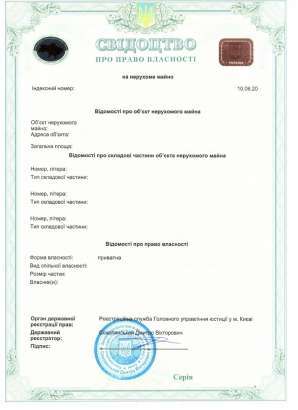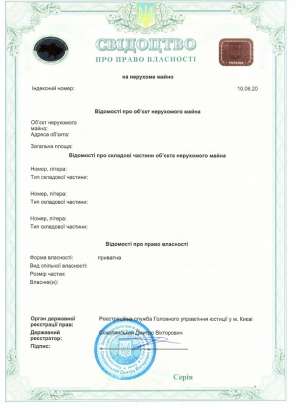Changes in Real Estate Taxation in 2025
Cost of services:
Reviews of our Clients
... our work on joint projects assured us of your high level of professionalism
In 2025, important changes were introduced to the taxation of real estate transactions. One of the most significant updates is the increase in the military levy from 1.5% to 5%, which has considerably raised the tax burden on property sellers. Additionally, the real estate tax law continues to require other mandatory payments, such as personal income tax (PIT), state duty, and contributions to the Pension Fund.
Given these updates, it is essential to understand how real estate taxes have changed in 2025 and what new taxes now apply to property sales. Let’s take a closer look at the taxes that legal entities must pay when selling real estate, as well as the mandatory payments individuals need to consider when buying or selling property.
You might also like: How to Sell or Buy an Apartment in Ukraine While Abroad: Completing a Real Estate Transaction Remotely
Tax Calculation on Real Estate Sales
The tax on real estate sales is calculated based on the length of property ownership and the number of sales made in a year. The tax rates vary as follows:
|
Condition |
Property Ownership Duration |
Tax |
|
First sale of the year |
Over 3 years |
PIT 0% |
|
Less than 3 years |
PIT 5% + military tax 5% |
|
|
Second and subsequent sales in the year |
Regardless of ownership duration |
PIT 18% + military tax 5% |
Please note! If the original purchase price of the property can be verified, the tax will only be paid on the difference between the purchase and sale prices.
Example calculation: For example, if you sell an apartment that you purchased for 1,000,000 UAH and sell it for 1,500,000 UAH, the PIT (18%) and military tax (5%) will be charged only on the difference of 500,000 UAH, not on the full sale amount. However, if you are unable to verify the original purchase price, the tax will be calculated on the entire sale amount.
You might also like: How We Assisted in Transferring Cash from Ukraine to Germany: Overcoming Challenges in Declaring Cash
Military Tax on Real Estate Sales
The most significant change in 2025 is the increase in property taxes, particularly the military tax, which has risen to 5%. This means that property sellers are now required to pay 3.5% more in taxes based on the sale price of their property.
Example calculation: For example, if you sell an apartment worth 1,000,000 UAH, the military tax will be 50,000 UAH instead of the previous 15,000 UAH. This difference can significantly impact the final decision when closing the deal.
The military tax is only levied when a property sale is subject to taxation. Therefore, if the sale is exempt from personal income tax, the military tax will not apply.
As for the taxation of corporate income from real estate sales in 2025, any income earned by a legal entity from selling property in Ukraine is subject to the basic corporate tax rate of 18% under the general rules.
Unlike individuals, the real estate tax law does not require legal entities to conduct an independent property appraisal before the sale. The corporate profit tax is calculated based on the sale price, without factoring in the appraised value. The primary documentary proof of the property’s value for legal entities is its balance sheet value.
Exemptions from Tax and Military Tax:
- The first sale of the year after 3 years of property ownership.
- The sale of inherited property, regardless of the ownership period.
As a result, the increase in the military tax by 3.5% can significantly raise the seller's expenses, particularly when selling high-value property. Therefore, the new tax rates on property sales have made the military tax an important factor in the financial planning of real estate transactions.
Additional Fees in Real Estate Transactions
In addition to property sales tax and military tax, real estate transactions come with additional expenses:
1. State Fee – 1% of the property’s value, paid by the seller when notarizing the agreement.
2. Pension Fund Contribution – 1% of the property’s value, paid by the buyer at the time of purchase.
3. Notary Fees
- Typically 0.5–1% of the property’s price.
- Additional costs may apply for accessing state registries and document processing.
4. Property Appraisal
- A mandatory step before completing the transaction.
- The cost depends on the type and value of the property.
5. Realtor’s Commission
- Typically 3–5% of the property’s value.
- This is not a required fee but is often part of the buyer’s or seller’s expenses.
It’s important to note that most of these expenses are mandatory and can significantly impact the overall budget of the transaction. Additional costs may also arise for document processing or obtaining certificates. We will help you plan your transaction carefully to avoid surprises and ensure a smooth and hassle-free process.
You might also like: Legal Support for Remote Real Estate Sales: How Ukrainians Can Sell an Apartment in Ukraine from Abroad
Tips for Real Estate Transactions in 2025
The changes in property taxes in 2025 have made real estate transactions more complex and financially costly. These changes require both buyers and sellers to approach the preparation and execution of deals more carefully. To avoid unnecessary expenses and risks during the buying or selling process, it is important to consider the key factors that will help you properly handle the transaction and optimize the tax burden:
1. Accurate tax calculation before the transaction. Before selling property, it is crucial to calculate all the taxes to be paid and explore possible ways to reduce them. To correctly calculate the tax on the sale of property, check if any exemptions apply (such as the sale after 3 years of ownership or the sale of inherited property).
2. Property appraisal before sale. An independent property appraisal is a mandatory step for notarizing the transaction. Keep in mind:
- The cost of the appraisal depends on the region and type of property.
- If the appraisal value is lower than the sale price stated in the contract, the tax will be calculated based on the higher amount.
- To reduce the tax burden, ensure you have documents that confirm the original purchase price.
3. Verifying the legal status of the property. Before buying or selling an apartment, it's important to check if there are any encumbrances or legal risks related to the property. Key checks include:
- Ownership verification and absence of liens (through the State Property Rights Register).
- No outstanding utility bills.
- Documentation confirming the legality of the construction (for newly built properties).
- The property’s transaction history (to avoid fraud).
4. Preparing a complete set of documents. To expedite the transaction, prepare all the necessary documents in advance:
- Proof of ownership (sales and purchase agreements, inheritance documents, etc.).
- The property’s technical passport.
- Property appraisal (performed by an independent appraiser).
- Tax payment receipts.
It’s also advisable to consult a notary in advance to understand any additional requirements.
5. Accounting for all additional expenses. In addition to taxes, consider other mandatory payments that arise in property transactions:
- Realtor’s commission – 3-5% of the property’s value.
- Notary fees – 0.5-1% of the property’s value.
- Registration fees for updating the property registry.
- Expenses for preparing certificates and documents.
You might also like: Power of Attorney Abroad for Use in Ukraine
How to Reduce Tax Burden and Avoid Mistakes
Recent changes in tax legislation have made real estate transactions more expensive. However, you can lower the tax burden and optimize transaction costs, making the process more financially advantageous. How can this be done? It is important to stay informed about the latest changes, calculate taxes in advance, explore potential ways to reduce them, and optimize costs for services that may arise during the transaction. To ensure this is done correctly, we recommend using the services of our company.
How We Can Help
Our lawyers have in-depth knowledge and many years of experience in handling real estate transactions, including remote property sales. We stay up to date with legal changes and are well-versed in all the details that can impact our clients’ interests. We offer comprehensive legal support for real estate deals and are ready to provide:
- Consultations on the new property sales taxes in 2025. We will calculate the tax on your property sale and determine whether it can be reduced.
- Verification of property documents to ensure legal clarity and avoid any risks.
- Drafting of sales and purchase agreements and checking the legal status of the property.
- Optimizing transaction costs in light of changes to property taxes.
With us, your real estate transaction will be not only profitable but also legally secure. Reach out to us to ensure your transaction is smooth and error-free!
Our clients















